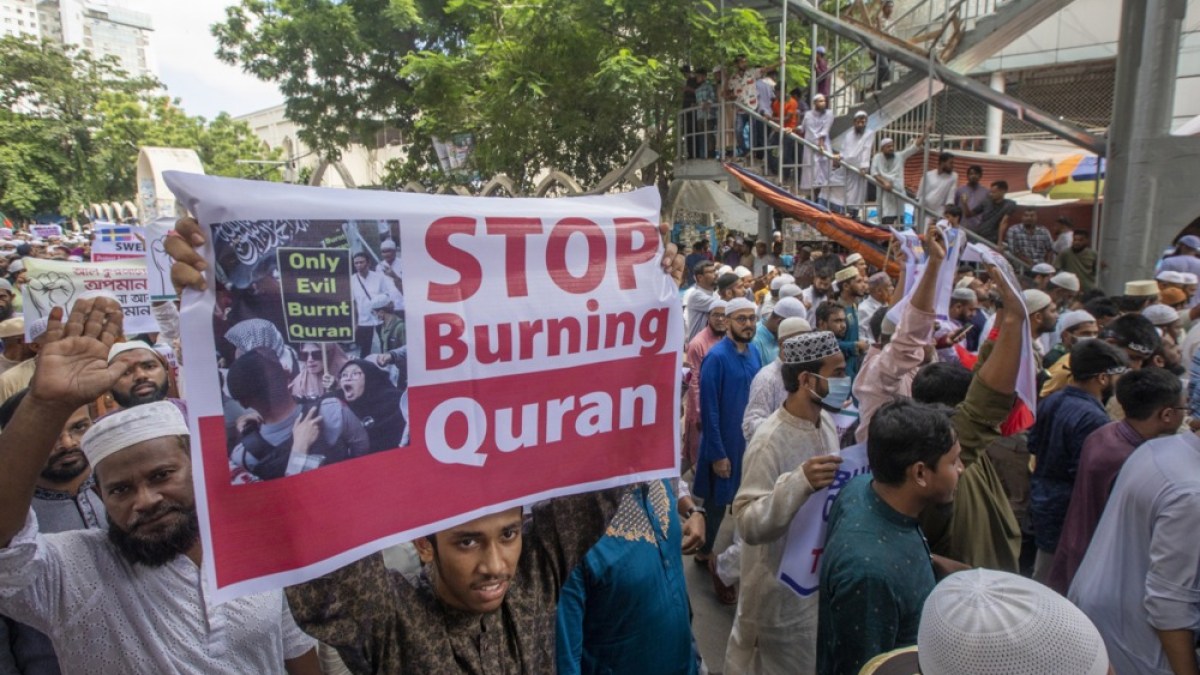Demonstrations have been held in several Muslim countries in recent weeks in response to the repeated desecration and burning of the Quran in Sweden and Denmark.
Muslim nations have been swift to respond with Saudi Arabia summoning the Danish charge d’affaires over the issue.
Iran also summoned the Swedish ambassador to Tehran while Iraq expelled Sweden’s top diplomat.
In Baghdad, hundreds of people tried to storm the Green Zone, a heavily fortified area with a number of foreign embassies and the seat of Iraq’s government.
Why are Muslims against the burning of the Quran?
The Quran is the holy book of Islam and its most sacred text. It is not merely a book but is considered the literal word of God, and Muslims treat it with utmost respect and reverence.
Muslims believe the Quran’s text has been preserved in its original form since the time of its revelation about 1,400 years ago. As such, Muslims see the burning of the Quran as a desecration of sacred scripture and an unacceptable act.
“This [burning of the Quran] is a humiliation of the faith and beliefs of Muslims, but what is more unfortunate is that this insult to the sanctities of a great population is happening under the guise of protecting freedoms,” Abbas Salimi Namin, a Tehran-based scholar, told Al Jazeera.
Islamic reverence
Muslims revere the Prophet Muhammad as the last and final messenger of God. Insulting or depicting him in disrespectful ways is considered a grave offence by Muslims.
Mosques are places of worship, and as such, they are regarded as sacred spaces. Any form of vandalism, desecration or disrespect towards mosques is deeply offensive to Muslims, much as it is for most other faiths and their holy figures or places of worship.
Hate crime?
Muslims make up a small minority of the populations in West European countries, and the majority are from non-white backgrounds. Some Muslims believe that the targeting of Islamic holy symbols for desecration is evidence of a wider climate of hatred towards Muslims and is encouraged by the European far-right.
This is coupled with far-right calls for an end to immigration from Muslim countries and even the expulsion of Muslim citizens as part of a conspiracy theory that Muslims will “replace” the “native” population of Europe.
While one of the main figures behind the recent spate of Quran burnings is an Iraqi Christian living in Sweden, many believe there is an effort from the far right to create communal tensions in Europe between non-Muslims and Muslims.
How did Muslim nations react to the burning of the Quran?
Muslim nations, including Iran and Pakistan, said the desecration of the Quran amounts to an incitement of violence and have called for accountability. Thousands took to the streets in several countries to condemn the burnings.
“It seems to me that by protesting against the Quran burning, Muslims are actually redefining what is love as well as reason,” Irfan Ahmad, a professor of anthropology at Ibn Haldun University in Istanbul, told Al Jazeera, “because as we know, the Quran burning is – unlike its depiction by the Western press – it is not a freedom of expression question, but it is an act of utter hatred and unreason.”
In July, a motion was filed at the United Nations human rights body in response to a Quran burning in Sweden. The motion called on countries to review their laws and plug gaps that may “impede the prevention and prosecution of acts and advocacy of religious hatred”.



Making a big international incident about it is just feeding the people doing it. Making international headlines is about the best outcome for a cause like that to achieve.